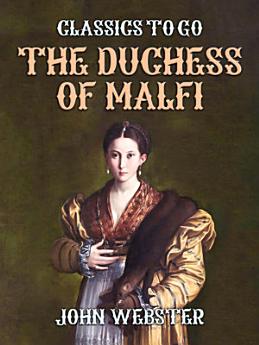The Duchess of Malfi
мар 2020. · Otbebookpublishing
E-knjiga
86
Stranica
family_home
Ispunjava uslove
info
reportOcene i recenzije nisu verifikovane Saznajte više
O ovoj e-knjizi
The Duchess of Malfi (originally published as The Tragedy of the Dutchesse of Malfy) is a Jacobean revenge tragedy written by English dramatist John Webster in 1612–1613. Published in 1623, the play is loosely based on events that occurred between 1508 and 1513 surrounding Giovanna d'Aragona, Duchess of Amalfi (d. 1511), whose father, Enrico d'Aragona, Marquis of Gerace, was an illegitimate son of Ferdinand I of Naples. As in the play, she secretly married Antonio Beccadelli di Bologna after the death of her first husband Alfonso I Piccolomini, Duke of Amalfi. The play begins as a love story, when the Duchess marries beneath her class, and ends as a nightmarish tragedy as her two brothers undertake their revenge, destroying themselves in the process.
O autoru
John Webster, an enigmatic figure of the 17th century, remains a captivating subject for those intrigued by the intersection of science, religion, and literature. Born around 1610, Webster's life unfolded during a period of profound upheaval in England, marked by the Civil War, the execution of Charles I, and the rise of the Commonwealth under Oliver Cromwell. A polymath, Webster was a clergyman, physician, and scholar whose intellectual pursuits spanned a variety of disciplines.Webster's literary contributions are notable for their bold challenges to the prevailing orthodoxies of his time. He was a fervent critic of the established medical practices and superstitions, advocating for a more empirical approach to science and medicine. His works often sparked controversy, as they questioned the legitimacy of widely accepted beliefs and practices, including the persecution of supposed witches and the reliance on alchemy.One of Webster's most revolutionary ideas was his early support for the scientific method, which placed him in the company of contemporary thinkers like Francis Bacon. His insistence on evidence-based inquiry influenced the gradual shift towards modern scientific thought, making him a precursor to the Enlightenment.Webster's influence extended to his contemporaries and beyond, as his writings provided a foundation for later debates on science and rationality. His life and work offer a fascinating glimpse into a transformative period in history, where the seeds of modernity were being sown amidst the remnants of medieval thought. For modern readers, Webster's legacy is a testament to the enduring power of questioning and intellectual courage.
Ocenite ovu e-knjigu
Javite nam svoje mišljenje.
Informacije o čitanju
Pametni telefoni i tableti
Instalirajte aplikaciju Google Play knjige za Android i iPad/iPhone. Automatski se sinhronizuje sa nalogom i omogućava vam da čitate onlajn i oflajn gde god da se nalazite.
Laptopovi i računari
Možete da slušate audio-knjige kupljene na Google Play-u pomoću veb-pregledača na računaru.
E-čitači i drugi uređaji
Da biste čitali na uređajima koje koriste e-mastilo, kao što su Kobo e-čitači, treba da preuzmete fajl i prenesete ga na uređaj. Pratite detaljna uputstva iz centra za pomoć da biste preneli fajlove u podržane e-čitače.








